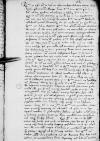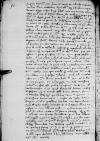Accepi ⌊⌋ Dominationis Vestrae Reverendissimae XVI huius datas aluta quadam involutas a subditis Dominationis Vestrae Reverendissimae. Quae eo mihi erant gratiores, quod me de his in hac exspectatione fratris mei, quae scire summopere de mente Dominationis Vestrae Reverendissimae desiderabam, reddiderunt certiorem. Placueruntque mihi non mediocriter ea, quae Dominatio Vestra Reverendissima ad aulam regiam reverendissimo ⌊domino Plocensi⌋ contra nostros adversarios descripsit, ad illa etiam, cum scribam, me accommodabo. In reliquis, quae prudenter apud se Dominatio Vestra Reverendissima reputavit, ne semper videamur conqueri, quamvis tot se nobis iustae causae offerant, mihi itidem satisfactum est, de his t(ame)n quaedam reverendissimo ⌊domino Plocensi⌋ refricanda esse non censeo futurum inutile. Videor mihi immo nos omnes in ea incidisse tempora, qua nulla nobis armatura quam patientia uti licet. Producti sumus in altum, quemcumque Deus ventum aut tempestatem immiserit, non immerito castigatione digni, ut feramus, oportet misericordiam eius implorantes et ut pacem nostris concedat temporibus etc.
Quae prius cum fratre meo scripsi in distributione episcopatuum, ita ad me erant perlata, certum autem nunc est, quemadmodum doctor ⌊Ioannes Benedicti⌋ Dominationi Vestrae Reverendissimae scripsit, quod ⌊domino Vilnensi⌋ episcopatus Posnaniensis datus est et communis amicus noster dominus ⌊Choinszki⌋ in ⌊Plocensi⌋ perseverat. De officiis cancellariae nihil adhuc, quod certum esset, compertum habeo etc. Non sum oblitus eorum, quae mihi de subdito suo praevaricatore Dominatio Vestra Reverendissima ⌊⌋ ex ⌊Heilsberg⌋ <X>III-a Ianuarii, illamque legem, quam mihi Dominatio Vestra Reverendissima annotavit et alia hoc negotium concernentia, diligenter expendi. Scio etiam quibus modis illi, qui se nobis amicos simulant, stulto et misero homini faveant, verum contra iustitiam eiusque defensorem Deum nihil poterunt. In me, cum res ad forum in proximo ⌊conventu⌋ venerit, quod pro tuenda aequitate optimaque existimatione Dominationis Vestrae Reverendissimae praestare valebo, nihil deerit neque quicquam a me desiderari patiar, hocque sibi de me Dominatio Vestra Reverendissima certo persuadeat. Interea vero, priusquam ⌊conventus⌋ noster celebrabitur, ad quem totum hoc negotium reiectum est, quid consulere debeam, non habeo; audiatur prius et videamus, quorsum duces eius illum impellunt, tum
cf. Ov. Am. 1.4.54 ⌊consilium nobis resque locusque dabuntcf. Ov. Am. 1.4.54 ⌋.
Quae Dominatio Vestra Reverendissima de ⌊ill(ustrissimo) vicino nostro⌋ scribit, prius mihi innotuerunt. Ego hoc egi, quod a me amicus meus, dominus ⌊Cornelius Scepperus⌋ postulavit, ut is qui nihil tum illi tum nobis magis commodum et necessarium esse arbitror quam pacem. Quicquid ab eo frater meus retulerit, Dominationem Vestram Reverendissimam non latebit. Ill(ustrissimus) ⌊dux Fredericus⌋ non est Bavariae dux, licet titulum habeat, sed comes palatinus Rheni. Exspectatque post ⌊Ludovicum comitem palatinum⌋  BCz,244,p. 70 Imperii electorem, iam senio et variis aegritudinibus confectum, eandem illam electoriam dignitatem. Isque ⌊Christierni captivi Danorum regis⌋ nuper duxit filiam, ratione cuius vivente adhuc ⌊patre⌋, nescio quod ius ad ⌊regnum Daniae⌋ sibi vindicare nequiquam nititur etc.
BCz,244,p. 70 Imperii electorem, iam senio et variis aegritudinibus confectum, eandem illam electoriam dignitatem. Isque ⌊Christierni captivi Danorum regis⌋ nuper duxit filiam, ratione cuius vivente adhuc ⌊patre⌋, nescio quod ius ad ⌊regnum Daniae⌋ sibi vindicare nequiquam nititur etc.
Litteras, quas Dominatio Vestra Reverendissima scribit suis superinscribed in place of crossed-out illis⌈illissuissuis superinscribed in place of crossed-out illis⌉ ad me esse iunctas, ut eas ad reverendissimum dominum ⌊archiepiscopum Gneznensem⌋ transmitterem text damaged⌈[rem]rem text damaged⌉, in aluta non repperi. Fortassis per oblivionem non sunt additae, dicunt enim subditi Dominationis Vestrae Reverendissimae, quod nisi unas ad me i[...] text damaged⌈[...][...] text damaged⌉[...] hidden by binding⌈[...][...] hidden by binding⌉ pellem illam receperint, neque illas commode nisi per proprium nuntium mittere potuissem etc.
Quod in calce scribit Dominatio Vestra Reverendissima se nuntium suum in ecclesiae suae negotiis propediem ad ⌊serenissimam maiestatem regiam⌋ missuram, liberum mihi faciens, si cum illo quippiam ad curiam scribere velim, cum oblatione quod nuntius is non secus de meis in reddendo responsoque reposcendo esse debeat diligens, quam cum ipsismet Dominationis Vestrae Reverendissimae litteris, pro quo amicissimo et paterno officio Dominationi Vestrae Reverendissimae, quas possum, gratias habeo. A me adhuc nihil ad curiam nostram scribi potest, priusquam frater meus, quem in horas exspecto, redierit. Mittam itaque nactus earum rerum, de quibus mihi scribendum erit, certam scientiam, paulo post tabellarium meum, qui inter eundum Dominationem Vestram Reverendissimam accedet. Cum quo eandem, quam mihi fecit, Dominationi Vestrae Reverendissimae securitatem, et si forsan voluerit, scribendi commoditatem offero etc.
De novis paulo ante dominus ⌊Ioannes a Werden⌋ ad me scripsit. Ex ⌊Lubeco⌋ XXV Ianuarii novissime litteras hidden by binding⌈[s]s hidden by binding⌉ ⌊Gdanum⌋ missas esse, quibus significatur textorem illum ⌊Wollenwefer⌋ adhuc apud ⌊Bremenses⌋ detineri; interfuisse confessioni eius vi extortae ill(ustrissimum) ducem Henricum Brunsvicen text damaged⌈[n]n text damaged⌉sem ex mandato ⌊maiestatis caesareae⌋, qui nondum venit in apertum, servatur quam hidden by binding⌈[uam]uam hidden by binding⌉ secretissime. Fertur tamen, quod miser iste ⌊textor⌋ ⌊Lubecum⌋ ⌊Ham text damaged⌈[m]m text damaged⌉burgum⌋ et alias quasdam civitates cum ⌊regno Daniae⌋ in partem text damaged⌈[m]m text damaged⌉ ⌊regis Angliae⌋ tradere statuisset, et ob id ⌊regem illum⌋ maximopere text damaged⌈[pere]pere text damaged⌉[1] instare, ut eum liberare posset, et quod ⌊Hamburgi⌋ nihil adhuc text damaged⌈[uc]uc text damaged⌉ solidi sit actum, pacem tamen sperare plerosque, quodque ⌊Hafnen text damaged⌈[n]n text damaged⌉(ses)⌋ et ⌊Elbigenses⌋ cum comite de ⌊Oldenburg⌋ et ⌊duce Alberto Mec text damaged⌈[ec]ec text damaged⌉kelburgensi⌋ petant a ⌊Lubecensibus⌋ subsidia, quae illis negantur paper damaged⌈[r]r paper damaged⌉, misisseque oratores ad curiam ⌊Burgundiae⌋, similiter et ⌊Lubecenses⌋ ⌊electusque Daniae rex dux Holsatiae⌋. Quid ibi tractabitur et expeditur, paulo post sciemus etc.
Dominationem Vestram Reverendissimam, cuius paterno amori me plurimum commendo, quam diutissime feliciter et optime valere ex animo cupio.
 BCz,244,p. 70 Imperii electorem, iam senio et variis aegritudinibus confectum, eandem illam electoriam dignitatem. Isque
BCz,244,p. 70 Imperii electorem, iam senio et variis aegritudinibus confectum, eandem illam electoriam dignitatem. Isque 
